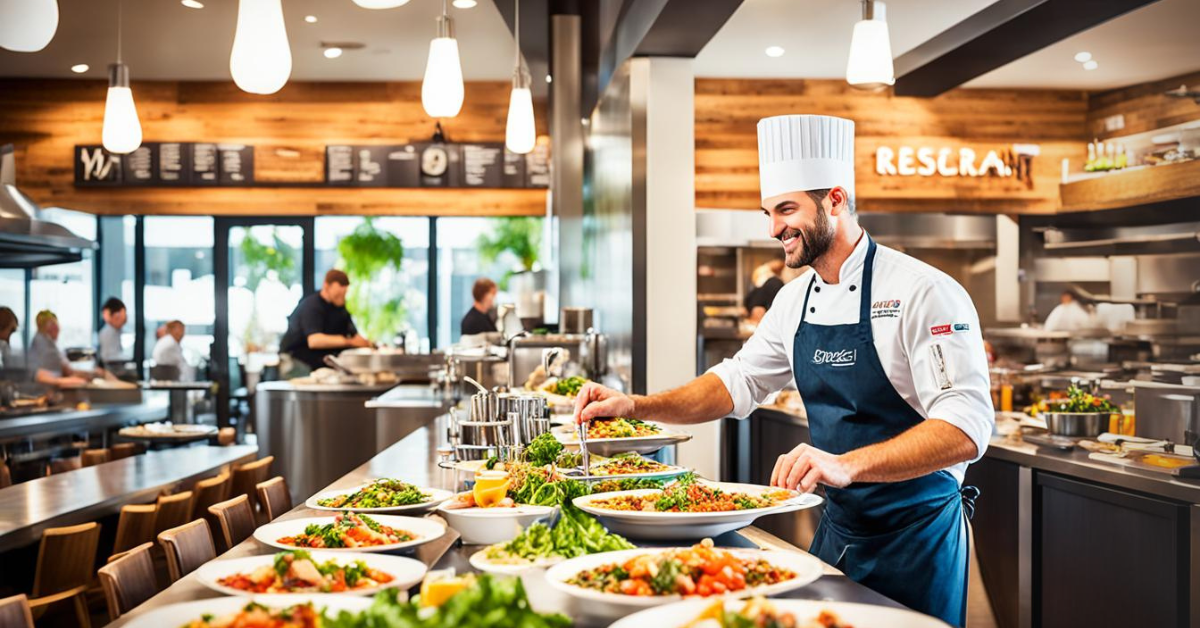From Dream to Dish: Funding Your Restaurant Startup Adventure
Starting a restaurant is like embarking on a culinary adventure. It’s exciting, challenging, and full of unexpected twists and turns. One of the biggest hurdles you’ll face as a small business owner is securing the funds to turn your restaurant dreams into reality. But don’t worry, we’re here to help you navigate the funding maze and set your restaurant startup on the path to success.
In this guide, we’ll explore various funding options, share tips for creating a solid financial plan, and walk you through the application process.
Understanding Your Funding Options
When it comes to funding your restaurant startup, there’s no one-size-fits-all solution. Let’s explore some of the most common options available to small business owners like you.
Traditional Bank Loans
Traditional bank loans are often the first option that comes to mind when thinking about business funding. These loans typically offer competitive interest rates and longer repayment terms, which can be attractive for new restaurant owners.
However, securing a traditional bank loan for a restaurant startup can be challenging. Banks often view restaurants as high-risk investments due to their notoriously low success rates. You’ll need a strong credit score, collateral, and a rock-solid business plan to improve your chances of approval.
Despite these challenges, don’t rule out traditional bank loans entirely. If you have a strong financial history and a well-thought-out business plan, this could still be a viable option for your restaurant startup.
Small Business Administration (SBA) Loans
The SBA offers loan programs that can be particularly beneficial for restaurant startups. These loans are partially guaranteed by the government, which makes lenders more willing to work with new businesses.
The most popular SBA loan program for restaurants is the 7(a) loan. This versatile loan can be used for various purposes, including purchasing equipment, renovating your space, or even buying an existing restaurant. SBA loans often offer more favorable terms than traditional bank loans, including lower down payments and longer repayment periods.
However, the application process for an SBA loan can be lengthy and require extensive documentation. But don’t let that discourage you – the benefits can make the effort worthwhile for many restaurant startups.
Alternative Funding Sources
In recent years, alternative funding sources have gained popularity among small business owners. These options can be particularly helpful for those who may not qualify for traditional loans or SBA loans for restaurants.
Crowdfunding platforms like Kickstarter or GoFundMe allow you to raise money from a large number of people, often in exchange for rewards or equity in your business. This can be an excellent way to gauge public interest in your restaurant concept while raising funds.
Angel investors and venture capitalists are another option, especially if your restaurant concept is innovative or has high growth potential. These investors provide capital in exchange for equity in your business.
Lastly, don’t overlook the power of personal networks. Friends, family, and local community members who believe in your vision might be willing to invest in your restaurant startup.
Financial Planning for Success
Now that we’ve explored various funding options, let’s focus on creating a solid financial plan for your restaurant startup. This is crucial not only for securing funding but also for ensuring the long-term success of your business.
Creating a Robust Business Plan
A well-crafted business plan is your roadmap to success and a key tool in securing funding. It should outline your restaurant concept, target market, competitive analysis, and detailed financial projections.
When creating your business plan, be realistic and thorough. Research your local market, understand your competition, and clearly articulate what makes your restaurant unique. This will not only help potential lenders or investors understand your vision but also guide your decision-making as you launch and grow your business.
Remember, your business plan isn’t just a document for securing loans – it’s a living guide that should evolve as your business grows and changes. Regularly revisiting and updating your plan can help keep you on track and adapt to changing market conditions.
Managing Costs and Budgeting
One of the biggest challenges in the restaurant industry is managing costs effectively. From food and labor to rent and utilities, expenses can quickly add up and eat into your profits.
Start by creating a detailed budget that accounts for all potential expenses. This should include obvious costs like ingredients and staff wages, as well as often-overlooked expenses such as insurance, marketing, and maintenance.
Consider using restaurant management software to help track your expenses and sales in real-time. This can provide valuable insights into your business’s financial health and help you make informed decisions about pricing, menu planning, and staffing.
Don’t forget to build a contingency fund into your budget. The restaurant business can be unpredictable, and having a financial cushion can help you weather unexpected challenges.
Forecasting Sales and Revenue
Accurate sales forecasting is crucial for financial planning and securing funding. While it can be challenging to predict sales for a new restaurant, there are several methods you can use to create realistic projections.
Start by researching industry benchmarks for restaurants similar to yours in size and concept. Look at factors like average check size, table turnover rates, and seasonality trends in your area.
Consider using a mix of conservative, moderate, and optimistic projections to give potential lenders or investors a range of possible outcomes. This demonstrates that you’ve thought critically about various scenarios and have plans in place for each.
Remember, your sales forecasts should align with your overall business strategy and marketing plans. Be prepared to explain how you’ll achieve your projected sales and what steps you’ll take if you fall short of your goals.
Navigating the Application Process
Once you’ve chosen your funding source and prepared your financial plan, it’s time to navigate the application process. This can be daunting, but with the right preparation, you can increase your chances of success.
Gathering Necessary Documents
Before you begin the application process, gather all the necessary documents. While requirements may vary depending on the funding source, common documents include:
- Business plan
- Financial statements (if you’re purchasing an existing restaurant)
- Personal and business tax returns
- Bank statements
- Proof of collateral (for secured loans)
- Licenses and permits
Having these documents organized and ready can streamline the application process and demonstrate your preparedness to potential lenders or investors.
It’s also a good idea to review your personal and business credit reports before applying for funding. If you spot any errors, take steps to correct them before submitting your application.
Approaching Different Funding Sources
Each funding source will have its own application process and requirements. Here’s a brief overview of what to expect:
For traditional bank loans or SBA loans for restaurants, you’ll typically need to submit a formal application along with your business plan and financial documents. Be prepared for a thorough review process that may include interviews or site visits.
When approaching angel investors or venture capitalists, you’ll usually start with a pitch deck – a brief presentation that outlines your business concept, market opportunity, and financial projections. If they’re interested, you’ll move on to more detailed discussions and due diligence.
For crowdfunding campaigns, focus on creating compelling content that tells your restaurant’s story and explains why people should support you. Consider offering unique rewards that tie into your restaurant concept.
Remember, regardless of the funding source, be honest and transparent in your application. Overstating your projections or hiding potential challenges can harm your credibility and jeopardize your funding chances.
Tips for Success
Securing funding for your restaurant startup is just the beginning of your entrepreneurial journey. Here are some additional tips to set yourself up for success:

Build Strong Relationships
Networking is crucial in the restaurant industry. Build relationships with local suppliers, other restaurant owners, and community leaders. These connections can provide valuable advice, potential partnerships, and even word-of-mouth marketing for your new restaurant.
Don’t underestimate the power of building a strong relationship with your lender or investors, either. Regular communication about your progress and challenges can foster trust and potentially open doors for future funding opportunities.
Lastly, focus on building strong relationships with your staff and customers. A positive workplace culture and excellent customer service can set your restaurant apart in a competitive market.
Stay Flexible and Adaptable
The restaurant industry is constantly evolving, and successful entrepreneurs need to be ready to adapt. Stay informed about industry trends, be open to feedback, and be willing to make changes when necessary.
This flexibility extends to your funding strategy as well. If one funding source doesn’t work out, be prepared to explore other options. Sometimes, a combination of funding sources might be the best solution for your restaurant startup.
Remember, setbacks are a normal part of the entrepreneurial journey. View them as learning opportunities and stay focused on your long-term goals.
Focus on Financial Management
Even after securing initial funding, ongoing financial management is crucial for your restaurant’s success. Regularly review your financial statements, monitor your cash flow, and look for ways to optimize your operations.
Consider working with a financial advisor or accountant who specializes in the restaurant industry. Their expertise can help you make informed decisions about everything from pricing strategies to tax planning.
Also Read: Launching Impact: A Beginner’s Guide to Starting a Non-Profit Organization
Embrace Technology
In today’s digital age, technology can be a powerful tool for restaurant owners. From point-of-sale systems that streamline operations to social media platforms that boost your marketing efforts, embracing technology can give your restaurant a competitive edge.
Look for technology solutions that can help you manage your finances more effectively, such as accounting software designed specifically for restaurants. These tools can provide valuable insights into your business performance and help you make data-driven decisions.
The journey of starting a restaurant is filled with challenges, but with the right funding, careful planning, and a passion for your craft, you can turn your culinary dreams into reality. Remember, securing funding is just the first step – it’s what you do with that funding that will ultimately determine your success.
As you move forward with your restaurant startup, stay focused on your vision, but remain flexible in your approach. Continuously educate yourself about the industry, seek advice from experienced restaurateurs, and always prioritize the quality of your food and service.






